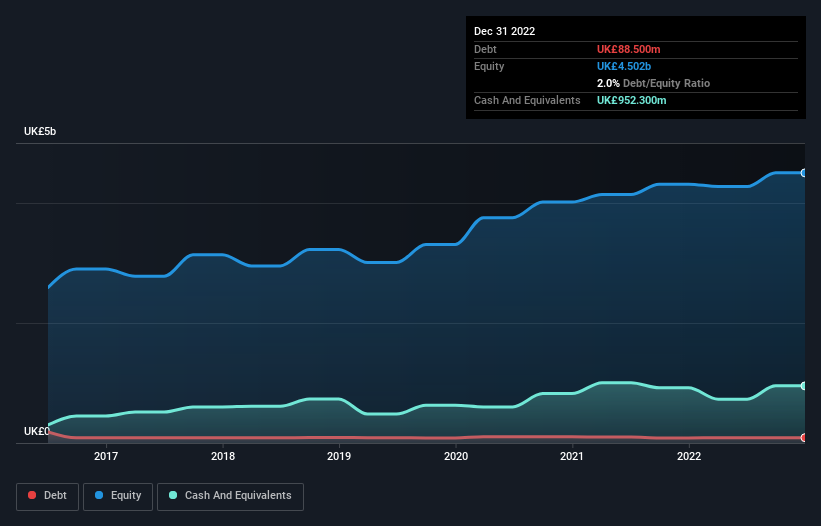
The external fund manager backed by Berkshire Hathaway's Charlie Munger, Li Lu, makes no bones about it when he says 'The biggest investment risk is not the volatility of prices, but whether you will suffer a permanent loss of capital.' So it might be obvious that you need to consider debt, when you think about how risky any given stock is, because too much debt can sink a company. Importantly, Taylor Wimpey plc (LON:TW.) does carry debt. But is this debt a concern to shareholders?
When Is Debt A Problem?
Debt assists a business until the business has trouble paying it off, either with new capital or with free cash flow. In the worst case scenario, a company can go bankrupt if it cannot pay its creditors. However, a more frequent (but still costly) occurrence is where a company must issue shares at bargain-basement prices, permanently diluting shareholders, just to shore up its balance sheet. Of course, the upside of debt is that it often represents cheap capital, especially when it replaces dilution in a company with the ability to reinvest at high rates of return. The first thing to do when considering how much debt a business uses is to look at its cash and debt together.
View our latest analysis for Taylor Wimpey
How Much Debt Does Taylor Wimpey Carry?
The image below, which you can click on for greater detail, shows that at December 2022 Taylor Wimpey had debt of UK£88.5m, up from UK£84.0m in one year. However, it does have UK£952.3m in cash offsetting this, leading to net cash of UK£863.8m.

How Healthy Is Taylor Wimpey's Balance Sheet?
According to the last reported balance sheet, Taylor Wimpey had liabilities of UK£1.34b due within 12 months, and liabilities of UK£640.5m due beyond 12 months. Offsetting this, it had UK£952.3m in cash and UK£191.2m in receivables that were due within 12 months. So it has liabilities totalling UK£837.5m more than its cash and near-term receivables, combined.
Given Taylor Wimpey has a market capitalization of UK£4.19b, it's hard to believe these liabilities pose much threat. But there are sufficient liabilities that we would certainly recommend shareholders continue to monitor the balance sheet, going forward. Despite its noteworthy liabilities, Taylor Wimpey boasts net cash, so it's fair to say it does not have a heavy debt load!
Also good is that Taylor Wimpey grew its EBIT at 10% over the last year, further increasing its ability to manage debt. The balance sheet is clearly the area to focus on when you are analysing debt. But ultimately the future profitability of the business will decide if Taylor Wimpey can strengthen its balance sheet over time. So if you're focused on the future you can check out this free report showing analyst profit forecasts.
Finally, a company can only pay off debt with cold hard cash, not accounting profits. Taylor Wimpey may have net cash on the balance sheet, but it is still interesting to look at how well the business converts its earnings before interest and tax (EBIT) to free cash flow, because that will influence both its need for, and its capacity to manage debt. Looking at the most recent three years, Taylor Wimpey recorded free cash flow of 28% of its EBIT, which is weaker than we'd expect. That's not great, when it comes to paying down debt.
Summing Up
While Taylor Wimpey does have more liabilities than liquid assets, it also has net cash of UK£863.8m. And it also grew its EBIT by 10% over the last year. So we are not troubled with Taylor Wimpey's debt use. When analysing debt levels, the balance sheet is the obvious place to start. However, not all investment risk resides within the balance sheet - far from it. Case in point: We've spotted 2 warning signs for Taylor Wimpey you should be aware of, and 1 of them makes us a bit uncomfortable.
Of course, if you're the type of investor who prefers buying stocks without the burden of debt, then don't hesitate to discover our exclusive list of net cash growth stocks, today.
Valuation is complex, but we're here to simplify it.
Discover if Taylor Wimpey might be undervalued or overvalued with our detailed analysis, featuring fair value estimates, potential risks, dividends, insider trades, and its financial condition.
Access Free AnalysisHave feedback on this article? Concerned about the content? Get in touch with us directly. Alternatively, email editorial-team (at) simplywallst.com.
This article by Simply Wall St is general in nature. We provide commentary based on historical data and analyst forecasts only using an unbiased methodology and our articles are not intended to be financial advice. It does not constitute a recommendation to buy or sell any stock, and does not take account of your objectives, or your financial situation. We aim to bring you long-term focused analysis driven by fundamental data. Note that our analysis may not factor in the latest price-sensitive company announcements or qualitative material. Simply Wall St has no position in any stocks mentioned.
About LSE:TW.
Flawless balance sheet and undervalued.


